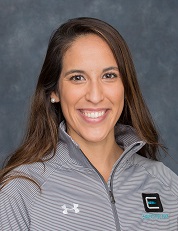Vanessa M. Kercher, Ph.D., SSC, M.Ed., BESS |
Aug.
15, 2019

Key Points:
1. Recognize barriers to applying for a job
2. Utilize strategies to submit a competitive application
I spent the last year searching for a new job. The process was fun and exciting but at the same time overwhelming and intimidating. Every employer has different requirements, though most require a resume and cover letter. If you are in academia, or trying to get back into academia like me, you may need to submit a teaching and research statement and a curriculum vitae (CV). Throughout my job hunt, I learned
four valuable lessons that I would like to share about stepping outside of your comfort zone in search of a new job, fresh employer, or maybe just a change of pace.
1. Beware of Barriers
Technology has helped make searching and applying for jobs more convenient than ever. What’s stopping you from exploring all the potential jobs that align with your skills and passions? As you begin your search and, there are two barriers ready to stand in your way:
- Barrier #1: Application Scramble! When is the last time you looked at your resume or CV? If you can’t remember how long it’s been, consider dusting off your materials or starting fresh! Trying to recall all your best accomplishments and experiences may seem like a daunting task at first, but it is time well spent. Your accomplishments highlight all the wonderful things you have done over the years. Taking time to recall your successes can reignite your pursuit of your dream job. Don’t miss the window to apply for that dream job simply because you don’t have your application materials updated. Start with a goal of updating your materials weekly or monthly so you’ll be ready to apply at any time.
- Barrier #2: Take the leap! Too many people miss opportunities to work in areas that truly match their passions and skills simply by not applying! Inertia, uncertainty and self-doubt prevents so many of us from taking the leap. The best time to find a job is when you have a job. Sure, there are so many unknowns when you apply to another job (Will it be better or worse than my current job? Will I like it?) but the only way to know is to try. Unfortunately, sometimes we are our biggest barrier. Not too long ago I applied for a job that I thought was out of reach and not likely to be interested in hiring someone like me. Fortunately, I applied anyway, and am proud to say I now work at Indiana University! Go Hoosiers! Get out of your own way and do not underestimate your value and skills.
2. Be Unapologetically Yourself
The key to landing your dream job is all about showcasing your passion to your potential new employer. Of course, it’s important to be professional, but who ever said that to be professional you have to lose your personality? We all have unique characteristics that the right employer will value. Keep these two tips in mind:
- Tip #1: Tailor your application to the job, but be yourself! Indeed, it is important to learn about the organization you’re applying to; however, if your goal is to shape your materials to show you fit perfectly with their culture, is it really you? Stand out in a way that’s thoughtful, smart and creative! The first line in my teaching statement reads “Teaching is my superpower.” Rarely would an opening statement like this be encouraged by traditional career advisors, but that’s my style. If a potential employer fails to recognize your passion, continue to the next opportunity until you find an employer that will appreciate you for you and your unique skills. After all, you want to like where you work and be yourself, right?
- Tip #2: Highlight your skills without trickery! We all have skills but showcasing them in a thoughtful way without embellishment will leave a more memorable impression on a potential employer than listing vague statements starting with “go getter” and “good communicator.” Highlight transferrable skills from your experiences relevant to the job to help potential employers understand your unique skill set. List each of your work experiences and job duties with action verbs to make impactful statements such as “Distributed over 200 surveys assessing motivation and physical activity behaviors in Latina college students.” If you do have unique skills, highlighting them in a thoughtful way will speak more to any potential future employer than embellishing.
3. Attention to Detail
Picture this: you’ve submitted your application expressing all the reasons why you’re a great fit for the job highlighting the rock star employee you are crammed into a document covered with spelling and grammar errors with a font too difficult and small to read. You may have eliminated yourself as a potential hire before they even got to know you. Pay attention to detail with these key tips:
- Tip # 1: Feedback! If you really want to be considered for the job, you’ve got to get someone else’s input and advice as you work on your job application materials. Send your materials to a mentor, friend or colleague who is currently working in the industry. Then, incorporate the feedback. Read your materials out loud to detect potential errors. If you sound like a robot whoever is reading your materials probably feels the same way.
- Tip #2: Try not to get too carried away! Employers may review hundreds of applications, which leaves you with little time to make an impression. There is a difference between standing out and being overwhelming. A great application does not need to be padded with too many details that make it hard for recruiters to determine if you qualify you as a candidate. Remove irrelevant or outdated details about your career. Format your materials in a clear layout so whoever reads it gets a quick overview of your experiences. Think of your job application materials as an ad, not an autobiography.
4. Resources! Students & Alumni!
There is a tremendous amount of resources you can find on the web but remember to take advantage of all the different university career services. Students and alumni often are encouraged to reach out to their career services for guidance when applying for jobs. My alma mater, the University of Idaho (Go Vandals!) does a tremendous job covering tips for resumes, CVs, cover letters, interview preparation and strategies, professional dress, thank you letters, and even salary and benefit negotiations! This was my primary resource for my recent job hunt, and it has been nearly three years since I graduated from UI. There are so many other universities and community colleges to utilize.
Additionally, if you are part of a member organization, you may have access to even more resources as a benefit of your membership. The American College of Sports Medicine offers resources such as:
Take Aways
Searching and applying for jobs is a click away so go for it! If you’re interested in learning more about compiling a resume be sure to check out Dr. Jim Peterson’s column, which published in the July/August issue of ACSM’s Health & Fitness Journal®, “10 Mistakes to Avoid When Compiling a Resume.”

Become an Alliance Member or Student Member to access this article and the full ACSM's Health & Fitness Journal® library
Article based on: Peterson JA. 10 Mistakes to Avoid When Compiling a Resume. ACSMs Health Fit J.2019; 23(4):50. (Members only)
Author:
 Vanessa M. Kercher
Vanessa M. Kercher, Ph.D., SSC, M.Ed., BESS, is a Clinical Assistant Professor in the Kinesiology Department for the School of Public Health at Indiana University. Dr. Kercher's research passion focuses on helping individuals optimize their physical activity experiences to promote sustainable, positive health behaviors. She serves as the digital editor of
ACSM’s Health & Fitness Journal®.
Read more Fit Features by Dr. Vanessa

Burnout: Thriving or Just Surviving?

5 Strategies for Success - Thriving Employees, Thriving Businesses